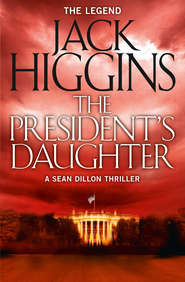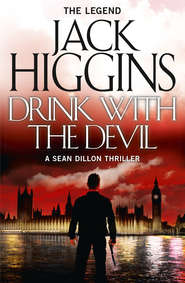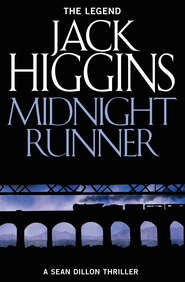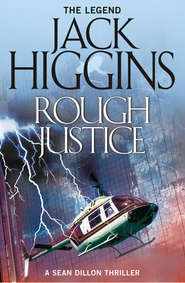По всем вопросам обращайтесь на: info@litportal.ru
(©) 2003-2024.
✖
The Last Place God Made
Автор
Год написания книги
2018
Настройки чтения
Размер шрифта
Высота строк
Поля
‘Bang, you’re dead.’ His voice crackled in my earphones. ‘I was doing Immelmanns for real when you were still breast-feeding, kid. See you in Landro.’
He banked away across the jungle where he had told me not to go and roared into the distance. For a wild moment, I wondered if he might be challenging me to follow, but resisted the impulse. He’d lost two pilots already on the Mortes. No sense in making it three unless I had to.
I throttled back and continued up-river at a leisurely hundred miles an hour, whistling softly between my teeth.
4
Landro
I came to Landro, dark clouds chasing after me, the horizon closing in – another of those sudden tropical rainstorms in the offing.
It was exactly as I had expected – a clearing in the jungle at the edge of the river. A crumbling jetty, piroques drawn up on the beach beside it, a church surrounded by a scattering of wooden houses and not much else. In other words, a typical up-river settlement.
The landing strip was at the north end of the place, a stretch of campo at least three hundred yards long by a hundred across. There was a windsock on a crude pole, lifting to one side in a slight breeze and a hangar roofed with corrugated iron. Hannah was down there now with three other men, pushing the Hayley into the hangar. He turned as I came in low across the field and waved.
The Bristol had one characteristic which made a good landing difficult for the novice. The undercarriage included rubber bungees which had a catapulting effect if you landed too fast or too hard, bouncing you back into the air like a rubber ball.
I was damned if I was going to make that kind of mistake in front of Hannah. I turned down-wind for my approach. A left-hand turn, I throttled back and adjusted the tail trimmer. I glided down steadily at just on sixty, selected my landing path and turned into the wind at five hundred feet, crossing the end of the field at a hundred and fifty.
Landing speed for a Bristol is forty-five miles an hour and can be made without power if you want to. I closed the throttle, eased back the stick to flatten my glide and floated in, the only sound the wind whispering through the struts.
I moved the stick back gradually to prevent her sinking and stalled into a perfect three-point landing, touching the ground so gently that I hardly felt a thing.
I rolled to a halt close to the hangar and sat there for a while, savouring the silence after the roar of the engine, then I pushed up my goggles and unstrapped myself. Hannah came round on the port side followed by a small, wiry man in overalls that had once been white and were now black with oil and grease.
‘I told you he was good, Mannie,’ Hannah said.
‘You did indeed, Sam.’ His companion smiled up at me.
The liking between us was immediate and mutually recognised. One of those odd occasions when you feel that you’ve known someone a hell of a long time.
Except for a very slight accent, his English was perfect. As I discovered later, he was fifty at that time and looked ten years older which was hardly surprising for the Nazis had imprisoned him for just over a year. He certainly didn’t look like a professor. As I’ve said, he was small and rather insignificant, untidy, iron-grey hair falling across his forehead, the face brown and wizened. But then there were the eyes, clear grey and incredibly calm, the eyes of a man who had seen the worst life had to offer and still had faith.
‘Emmanuel Sterne, Mr Mallory,’ he said as I dropped to the ground.
‘Neil,’ I told him and held out my hand.
He smiled then, very briefly and thunder rumbled across the river, the first heavy spots of rain staining the brown earth at my feet.
‘Here we go again,’ Hannah said. ‘Let’s get this thing inside quick. I don’t think this is going to be any five-minute shower.’
He gave a yell and the other two men arrived on the run. They were simply day labourers who helped out with the heavy work when needed for a pittance. Undernourished, gaunt-looking men in straw hats and ragged shirts.
There were no doors to the hangar. It was really only a roof on posts, but there was plenty of room for the Bristol beside the Hayley. We had barely got it in when the flood descended, rattling on the corrugated-iron roof like a dozen machine-guns. Outside, an impenetrable grey curtain came down between us and the river.
Mannie Sterne was standing looking at the Bristol, hands on hips. ‘Beautiful,’ he said. ‘Really beautiful.’
‘He’s fallen in love again.’ Hannah took down a couple of old oilskin coats from a hook and threw me one. ‘I’ll take you to the house. You coming, Mannie?’
Mannie was already at the engine cowling with a spanner. He shook his head without looking round. ‘Later – I’ll be along later.’
It was as if we had ceased to exist. Hannah shrugged and ducked out into the rain. I got my canvas grip from the observer’s cockpit and ran after him.
The house was at the far end of the field, not much more than a wooden hut with a veranda and the usual corrugated iron roof. It was built on stilts as they all were, mainly because of the dampness from all that heavy rain, but also in an attempt to keep out soldier ants and other examples of jungle wildlife.
He went up the steps to the veranda and he flung open a louvred door and led the way in. The floor was plain wood with one or two Indian rugs here and there. Most of the furniture was bamboo.
‘Kitchen through there,’ he said. ‘Shower-room next to it. There’s a precipitation tank on the roof so we don’t lack for a generous supply of decent water, it rains so damn much.’
‘All the comforts of home,’ I said.
‘I would think that something of an overstatement.’ He jerked his thumb at a door to the left. ‘That’s my room. You can share with Mannie over here.’
He opened the door, stood to one side and motioned me through. It was surprisingly large and airy, bamboo shutters open to the veranda. There were three single beds, another of those Indian rugs on the floor and there were actually some books on a shelf beside the only bed which was made up.
I picked one up and Hannah laughed shortly. ‘As you can see, Mannie likes a good read. Turned Manaus upside down for that little lot.’
The book was Kant’s Critique of Pure Reason. I said, ‘This must have been like putting his pan in the river for water and coming up with a diamond.’
‘Don’t tell me you go for that kind of stuff, too?’ he looked genuinely put out. ‘God help me, now I do need a drink.’
He went back into the living-room. I chose one of the unoccupied beds, made it up with blankets from a cupboard in the corner, then unpacked my grip. When I returned to the other room he was standing on the veranda, a glass in one hand, a bottle of Gordon’s gin in the other.
The rain curtain was almost impenetrable, the first few wooden huts on their stilts at the edge of town, the only other sign of life.
‘Sometimes when it gets like this, I could go crazy,’ he said. ‘It’s as if this is all there is. As if I’m never going to get out.’
He tried to re-fill his glass, discovered the bottle was empty and threw it out into the rain with a curse. ‘I need a drink. Come on – if you’re not too tired I’ll take you up town and show you the sights. An unforgettable experience.’
I put on my oilskin coat again and an old straw sombrero I found hanging behind the bedroom door. When I returned to the veranda he asked me if I was still carrying my revolver. As it happened, it was in one of my flying-jacket pockets.
He nodded in satisfaction. ‘You’ll find everybody goes armed here. It’s that kind of place.’
We plunged out into the rain and moved towards the town. I think it was one of the most depressing sights I have ever seen in my life. A scabrous rash of decaying wooden huts on stilts, streets which had quickly turned into thick, glutinous mud. Filthy, ragged little children, many of them with open sores on their faces, played listlessly under the huts and on the verandas above, people stared into the rain, gaunt, hopeless, most of them trapped in that living hell for what remained of their wretched lives, no hope on earth of getting out.
The church was more substantial and included a brick and adobe tower. I commented on that and Hannah laughed shortly. ‘They don’t even have a regular priest. Old guy called Father Conté who works with the nuns up at Santa Helena drops in every so often to say a Mass or two, baptise the babies and so on. He’ll be coming back with us tomorrow, by the way.’
‘You want me to go with you?’
‘I don’t see why not.’ He shrugged. ‘It’s only a hundred-mile trip. Give you a chance to fly the Hayley. We’ll have a passenger. Colonel Alberto from Forte Franco. He’ll arrive about ten in the morning by boat.’
‘What’s he do? Some kind of regular inspection?’
‘You could say that.’ Hannah smiled cynically. ‘The nuns up there are American. Little Sisters of Pity and very holy ladies indeed. The kind who have a mission. Know what I mean? The government’s been trying to get them to move for a year or so now because of the way the Huna have been acting up, only they won’t go. Alberto keeps trying, though, I’ll say that for him.’
In the centre of the town, we came to the only two-storeyed building in the place. The board above the wide veranda said Hotel and two or three locals sat at a table without talking, staring lifelessly into space, rain blowing in on them.
‘The guy who runs this place is important enough to be polite to,’ Hannah observed. ‘Eugenio Figueiredo. He’s the government agent here so you’ll be seeing a lot of him. All mail and freight has to be channelled through him for the entire upper Mortes region.’











